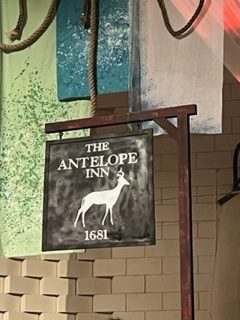 AFTER my mother died, I inherited a little oil painting of a sailing vessel. I knew it from my parents’ house but had never looked on the back of it (why would I?) When I did, I found a typed note with the story of the boat and of my great-great grandfather, who had sailed from Poole to fish the Grand Banks off Newfoundland. It was during the 19th century rural depression and there was little or no work in Dorset and Somerset. He contracted TB and died out in Newfoundland.
AFTER my mother died, I inherited a little oil painting of a sailing vessel. I knew it from my parents’ house but had never looked on the back of it (why would I?) When I did, I found a typed note with the story of the boat and of my great-great grandfather, who had sailed from Poole to fish the Grand Banks off Newfoundland. It was during the 19th century rural depression and there was little or no work in Dorset and Somerset. He contracted TB and died out in Newfoundland.
This previously unknown (to me) family story has inevitably given me a special interest in the connections between Dorset and Canada’s easternmost province. Through the researches of local author Roger Guttridge and musician and oral historian Tim Laycock, I have learned a lot, and I was fascinated to discover more in Salt, Poole’s first ever community play, staged in promenade style in the Lighthouse concert hall, with scenes also played around the town centre during the day.
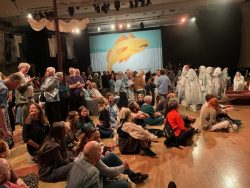 Dorset’s own inventive Angel Exit Theatre company produced the play, which was written by Stephanie Dale, who also wrote this year’s (Covid-delayed) Dorchester community play. The Poole production involved hundreds of local people, 12 Newfoundlanders (by Zoom), as well as professional actors, musicians and creatives and 125 students of Arts University Bournemouth who made the wonderful costumes. With the total backing of Lighthouse chief executive Elspeth McBain and her team, and funding and support from Historic England, the Arts Council, the Heritage Lottery, the Talbot Village Trust, Poole BID, Activate and BCP Council, the production played to sell-out houses for four nights.
Dorset’s own inventive Angel Exit Theatre company produced the play, which was written by Stephanie Dale, who also wrote this year’s (Covid-delayed) Dorchester community play. The Poole production involved hundreds of local people, 12 Newfoundlanders (by Zoom), as well as professional actors, musicians and creatives and 125 students of Arts University Bournemouth who made the wonderful costumes. With the total backing of Lighthouse chief executive Elspeth McBain and her team, and funding and support from Historic England, the Arts Council, the Heritage Lottery, the Talbot Village Trust, Poole BID, Activate and BCP Council, the production played to sell-out houses for four nights.
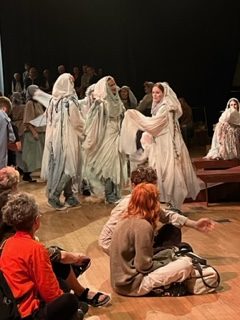 The story begins and ends at the old Antelope Hotel, where in 1681, Captain Storey calls for women to join fishermen on a North Atlantic fishing expedition, with the intention of settling the “new found land.” We get to know some of the women who volunteered (some fleeing abusive husbands or fathers, some just looking for husbands or freedom) and some of the hard-bitten men who had made such perilous voyages before.
The story begins and ends at the old Antelope Hotel, where in 1681, Captain Storey calls for women to join fishermen on a North Atlantic fishing expedition, with the intention of settling the “new found land.” We get to know some of the women who volunteered (some fleeing abusive husbands or fathers, some just looking for husbands or freedom) and some of the hard-bitten men who had made such perilous voyages before.
With a large chorus of sea spirits/wind spirits/fish spirits, striking puppets and simple sets representing the Antelope Inn and Poole Harbour, the ship and the fragile first settlement, the action moved around the huge concert hall floor, with music and singing, composed by Tim Laycock, much of it drawing on traditional sea shanties and folk songs from Dorset that made their way to Canada.
It is an exciting and moving show, capturing the danger, the horror, the fear, the occasional joy and the brutal, relentless, hard work – the women are making and mending nets, and gutting, salting and drying the cod as the men fish and fight off French fishermen who are constantly cutting the English nets. There are moments of high drama – a violent tempest at sea, a devastating fire in the settlement – and of deep emotion, including a tender romance between a young mother and a seaman who saves her baby from the fire.
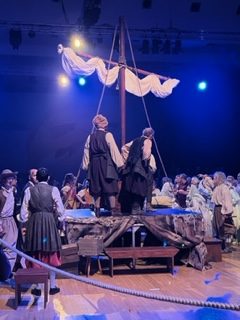 For those who took part in the promenade performance, the complicated story became clear after a fairly short time, although it was often difficult to hear the actual words – the second half had a clearer narrative line and was generally much easier to follow. But for those who were sitting, it was often impossible to see what was happening and there were real problems with hearing the dialogue. Raked seating would have helped, as would better use of microphones – the concert hall is a vast space, well suited to music from heavy metal to classical, but acoustically very difficult for the spoken word.
For those who took part in the promenade performance, the complicated story became clear after a fairly short time, although it was often difficult to hear the actual words – the second half had a clearer narrative line and was generally much easier to follow. But for those who were sitting, it was often impossible to see what was happening and there were real problems with hearing the dialogue. Raked seating would have helped, as would better use of microphones – the concert hall is a vast space, well suited to music from heavy metal to classical, but acoustically very difficult for the spoken word.
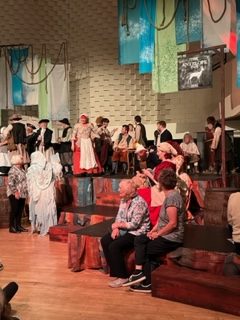 There was also a 21st century thread involving a small group of obviously talented young people and it was difficult to see how this tied in to the main story – it may have suggested the insecurity of life and work today (as in the late 17th century), and also perhaps referred to the way over-fishing drove the once-massive cod stocks to the edge of extinction in the North Atlantic.
There was also a 21st century thread involving a small group of obviously talented young people and it was difficult to see how this tied in to the main story – it may have suggested the insecurity of life and work today (as in the late 17th century), and also perhaps referred to the way over-fishing drove the once-massive cod stocks to the edge of extinction in the North Atlantic.
However, these concerns aside, this was a triumph – and as a first community play, it was a remarkable achievement. Dorchester, with its seven community plays, has learned a lot about staging and how to position seated audiences as well as allowing for the movement of promenaders.
This was a first for Poole and for Elspeth and the Lighthouse team. Working with such experienced and talented professionals as Lynne Forbes and Tamsin Fessey of Angel Exit, the huge company created a work that will remain long in the memory of all those who saw it, and perhaps even more so in the hearts of all those who took part. As one of those involved in the production said to us afterwards, the process for the community is almost as important as the experience of the audience.
FC